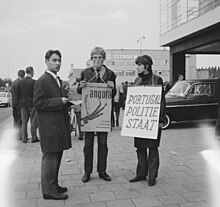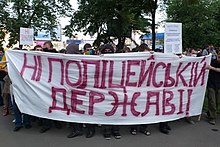Police state
A police state is a state where the government maintains tight control over society, particularly through the suppression of civil liberties and often by means of a secret police force and extensive military deployment. investment in surveillance mechanisms. This implies that control by the government contradicts the will of the individuals who are being controlled. Thus, a police state is inherently undemocratic and is akin to martial law.
Originally, a police state was a state governed by a civil administration, but since the early XX century it has &# 34;acquired an emotional and derogatory meaning" describing an undesirable state of life characterized by the overbearing presence of civil authorities. Inhabitants of a police state may experience restrictions on their mobility, or on their freedom to express or communicate political or other opinions, which are subject to the surveillance or police enforcement. Political control can be exercised by means of a secret police force that operates outside the limits normally imposed by a constitutional state. Robert von Mohl, who first introduced the rule of law into German jurisprudence, contrasted the Rechtsstaat ("legal state" or "constitutional") with the anti-aristocratic Polizeistaat ("police state").
Conception
Etymologically, the term police is derived from the ancient Greek πολιτεία (politeia) or polis (English: "city"). Initially it referred to the entire public administration. Good police have been used to express good administration since the Middle Ages.
This importance continued into the era of absolutism. According to the prevailing state model, the respective monarchical ruler had an absolutely legitimized position of power, the limits of administrative action were only determined by the "well-being" of the subjects. The content of "well-being" or "good police" it was defined by the authorities at their discretion.
As a result of social change, particularly after the Congress of Vienna, the police state became increasingly repressive to stifle emerging liberal and democratic aspirations. The police state thus became an instrument in the fight against political dissidents (in the absolutist state structure, an opposition was nothing more than an offense against the interests of the state and, therefore, also against the interests of its subjects).
Since then, the police state has been defined as a political system in which the police are omnipotent and the individual is virtually powerless. This meaning of the word, which emphasizes the contrast with the rule of law, arose in the Biedermeier period.
In the period that followed, constitutional states arose in which the police (including the administration) can only act on the basis of laws (reservation of law). As a result, the term police in democratic states was increasingly abolished (health police, building police, and immigration police were renamed health department, building inspection authority, and immigration bureau). The constant development of police law, administrative law, criminal law and, ultimately, the constitution with basic rights leads to greater legal certainty and also to a juridification of more and more areas of life.
Literature
In literature, the best example of a police state is the one posed in George Orwell's novel 1984, which describes a totalitarian regime that uses the excuse of constant war to allow the police to and security cameras control the entire population.
Another example of a police state is presented in the graphic novel V for Vendetta, written by Alan Moore, clearly influenced by Orwell's work. There a British government is presented that controls the population through strict surveillance using practically the same methods as in 1984. In V for Vendetta fundamental elements such as the constitution of authority, the elimination of oppositions and differences and media manipulation.
Police States
Examples of police states could be found in Germany during Nazism, in the Soviet Union under the communist regime of Stalin and his successors, in Yugoslavia during the Tito dictatorship, in East Germany where the Stasi was created. for state security), thus copying the model of the Union of Soviet Socialist Republics to control all citizens, in Spain during the Franco regime, likewise a police state was established in Argentina through the Organic Law for the Federal Police through decree 333 during the dictatorship of Pedro Eugenio Aramburu, then de facto president, setting up a police state through social control agencies.
Considerations
Similar to Orwell's perspective, the police state exercises over the population located in the territory over which it has jurisdiction, and that the difference lies only in the degree of invasion of freedoms, where this is also difficult to define, since that all States secretly monitor their entire population - or publicly but under the conviction and civil approval that they are being protected for their own good - to the extent of their resources or the interests they protect. And precisely due to the fact that it is secret or made up, the magnitude of the event and the real intentions behind the entire surveillance apparatus are not fully known.
Examples of states with related attributes
Some have characterized the rule of King Henry VIII during the Tudor period as a police state. The Oprichnina established by Tsar Ivan IV within the Russian Tzar in 1565 functioned as a predecessor of the modern police state, with persecutions and government autocratic.
Nazi Germany grew out of an originally democratic government, but gradually exercised increasingly repressive controls over its population in the run-up to World War II. In addition to the SS and the Gestapo, the Nazi police state used the judiciary to assert control over the population from the 1930s until the end of the war in 1945.
During the apartheid period, South Africa maintained attributes of a police state such as banning individuals and organizations, holding political prisoners, maintaining segregated living communities, and restricting movement and access.
The Chile of Augusto Pinochet functioned as a police state, exhibiting "the repression of public liberties, the elimination of political exchange, the limitation of freedom of expression, the abolition of the right to strike, the freezing of wages".
The Republic of Cuba under President (and later right-wing dictator) Fulgencio Batista was an authoritarian police state during his rule. Police influence increased after his overthrow during the Cuban Revolution in 1959 with the rise to power of Fidel Castro and the founding of a Marxist-Leninist republic.
The region of present-day North Korea is claimed to have elements of a police state, from the Juche-style kingdom of Silla, to the imposition of a fascist police state by the the totalitarian police state imposed and maintained by the Kim family. Paris-based Reporters Without Borders has ranked North Korea last or second to last on its press freedom test since the introduction of Press Freedom Index, [when?] claiming that the ruling Kim family controls all media.
In response to government proposals to enact new security measures to curb protests, the Justice and Development Party government has been accused of turning Turkey into a police state.
Since the 2013 Egyptian coup, Egypt's military government has reportedly taken several steps to suppress freedom of religion and expression in an effort to curb religious extremism, leading to accusations that it has become effectively a "revolutionary police state". Also in the Middle East, theocratic countries such as Saudi Arabia are considered police states —especially since the proclamation, in 2017, of Mohammed bin Salman as crown prince— or Iran —since the establishment of the ayatollah regime in 1979.
The dictatorship of Ferdinand Marcos from the 1970s to the early 1980s in the Philippines has many characteristics of a police state.
Fictional Police States
Fictional police states have appeared in media ranging from novels to movies to video games. George Orwell's novel 1984 was described by the Encyclopedia of Police Science as "the definitive fictional treatment of a police state, which has also influenced the use contemporary of the term".
Orwell's novel depicts Britain under the totalitarian Oceanian regime that continually invokes (and helps provoke) perpetual war. This perpetual war is used as a pretext to subject the people to massive surveillance and invasive police searches. The novel has been described as "the definitive fictional treatment of a police state, which has also influenced contemporary usage of the term".
Contenido relacionado
History of Christianity during the Middle Ages
Ariel Sharon
Act of Independence of the Mexican Empire

